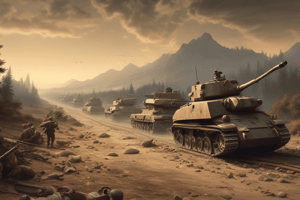Podcast
Questions and Answers
Which event is considered the immediate trigger of World War I?
Which event is considered the immediate trigger of World War I?
- The rise of nationalist sentiments in the Balkans
- The buildup of military forces in European countries
- The competition for colonies and resources
- The assassination of Archduke Franz Ferdinand (correct)
What was the outcome of the Battle of the Marne in 1914?
What was the outcome of the Battle of the Marne in 1914?
- The German advance on Paris was halted (correct)
- The German army captured Paris
- The French army was pushed back to the Alps
- The battle led to a decisive victory for the Allies
Which battle was fought between German and French forces in 1916 and resulted in over 700,000 casualties?
Which battle was fought between German and French forces in 1916 and resulted in over 700,000 casualties?
- Battle of the Frontiers
- Battle of the Somme
- Battle of Verdun (correct)
- Battle of Cambrai
What was the main characteristic of the Battle of the Frontiers in 1914?
What was the main characteristic of the Battle of the Frontiers in 1914?
What was the outcome of the Battle of Cambrai in 1917?
What was the outcome of the Battle of Cambrai in 1917?
What was one of the consequences of the Treaty of Versailles?
What was one of the consequences of the Treaty of Versailles?
What was a major impact of women's new roles in the workforce during World War I?
What was a major impact of women's new roles in the workforce during World War I?
What was a characteristic of trench warfare on the Western Front?
What was a characteristic of trench warfare on the Western Front?
What was a consequence of the blockade and submarine warfare?
What was a consequence of the blockade and submarine warfare?
What was a role of governments during World War I?
What was a role of governments during World War I?
Flashcards are hidden until you start studying
Study Notes
Causes of WWI
- Assassination of Archduke Franz Ferdinand: The murder of the Austro-Hungarian heir in Sarajevo, Bosnia, by Gavrilo Princip, a Serbian nationalist, triggered a chain reaction of events leading to the war.
- Nationalism: Rising nationalist sentiments in various European countries, particularly in the Balkans, contributed to the outbreak of war.
- Imperialism: Competition for colonies and resources led to tensions between European powers.
- Militarism: The buildup of military forces and arms races in European countries created an atmosphere of hostility.
- Alliances: Complex systems of alliances, including the Triple Entente (France, Russia, and Britain) and the Triple Alliance (Germany, Austria-Hungary, and Italy), drew countries into the conflict.
Major Battles
- Battle of the Frontiers (1914): A series of battles fought along the French-German border, resulting in heavy casualties and a stalemate.
- Battle of the Marne (1914): A decisive battle that halted the German advance on Paris and led to the trenches of the Western Front.
- Battle of Verdun (1916): A brutal and bloody battle fought between German and French forces, resulting in over 700,000 casualties.
- Battle of the Somme (1916): A disastrous Allied offensive that resulted in heavy casualties and little territorial gain.
- Battle of Cambrai (1917): A British tank attack that initially broke through the German lines, but ultimately ended in defeat.
Treaty of Versailles
- Terms:
- Germany accepted responsibility for the war and its damages.
- Germany was forced to disarm and reduce its military.
- Germany lost territories, including Alsace-Lorraine to France and Saar to the League of Nations.
- The treaty imposed heavy reparations on Germany.
- Consequences:
- The treaty's harsh terms contributed to widespread resentment in Germany and paved the way for the rise of Nazi power.
- The treaty's failure to establish a lasting peace led to the outbreak of World War II.
Home Front
- Rationing and shortages: Governments implemented rationing and conservation measures to allocate scarce resources and reduce waste.
- Women in the workforce: Women took on new roles in the workforce, replacing men who had gone to fight.
- Propaganda and censorship: Governments used propaganda to boost morale and censor information to maintain secrecy and control.
- Civilian casualties: Air raids and naval blockades caused significant civilian casualties and disrupted daily life.
War Strategies
- Trench warfare: A stalemate of trench warfare characterized the Western Front, with soldiers dug in and fighting from fixed positions.
- Total war: Governments mobilized entire societies, including civilians, to contribute to the war effort.
- Technological innovations: The war saw the introduction of new technologies, including tanks, airplanes, and poison gas.
- Blockade and submarine warfare: Navies employed blockades and submarines to disrupt enemy supply lines and sink merchant ships.
Studying That Suits You
Use AI to generate personalized quizzes and flashcards to suit your learning preferences.




